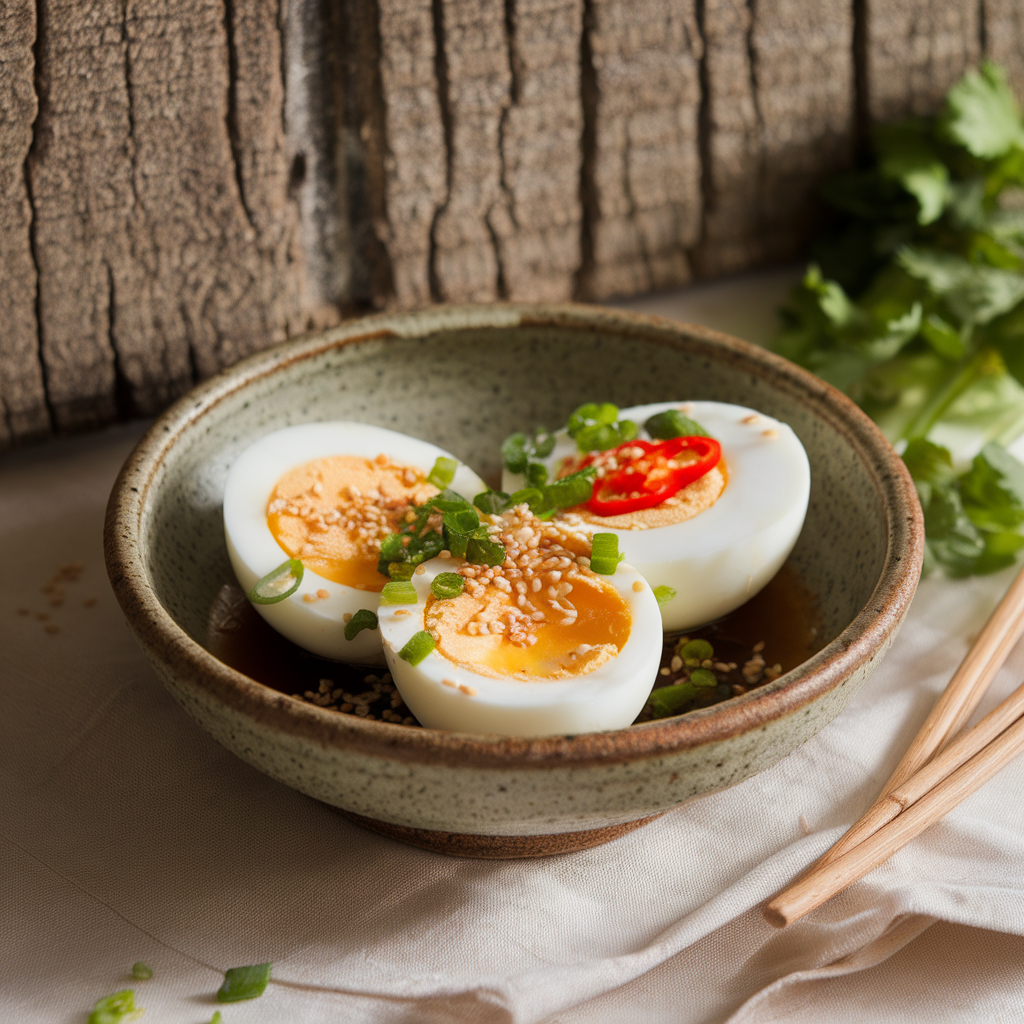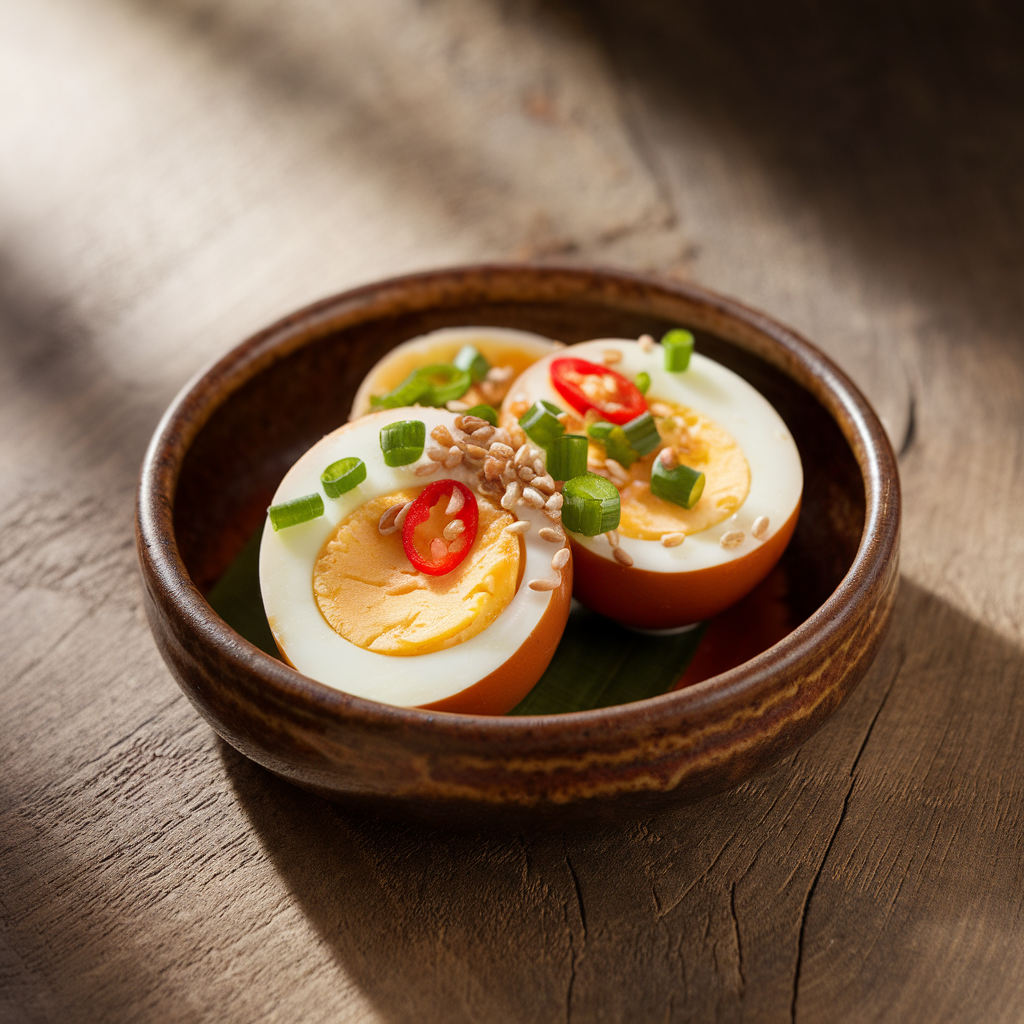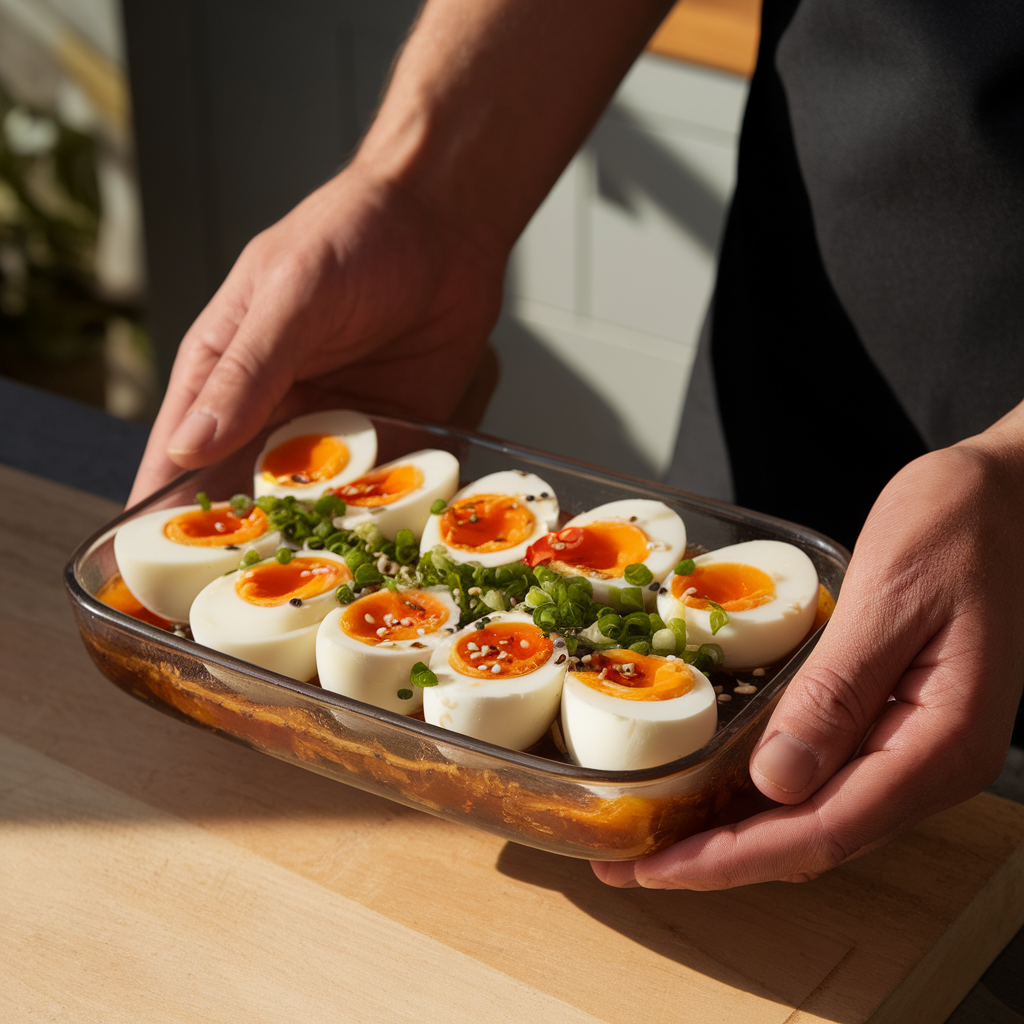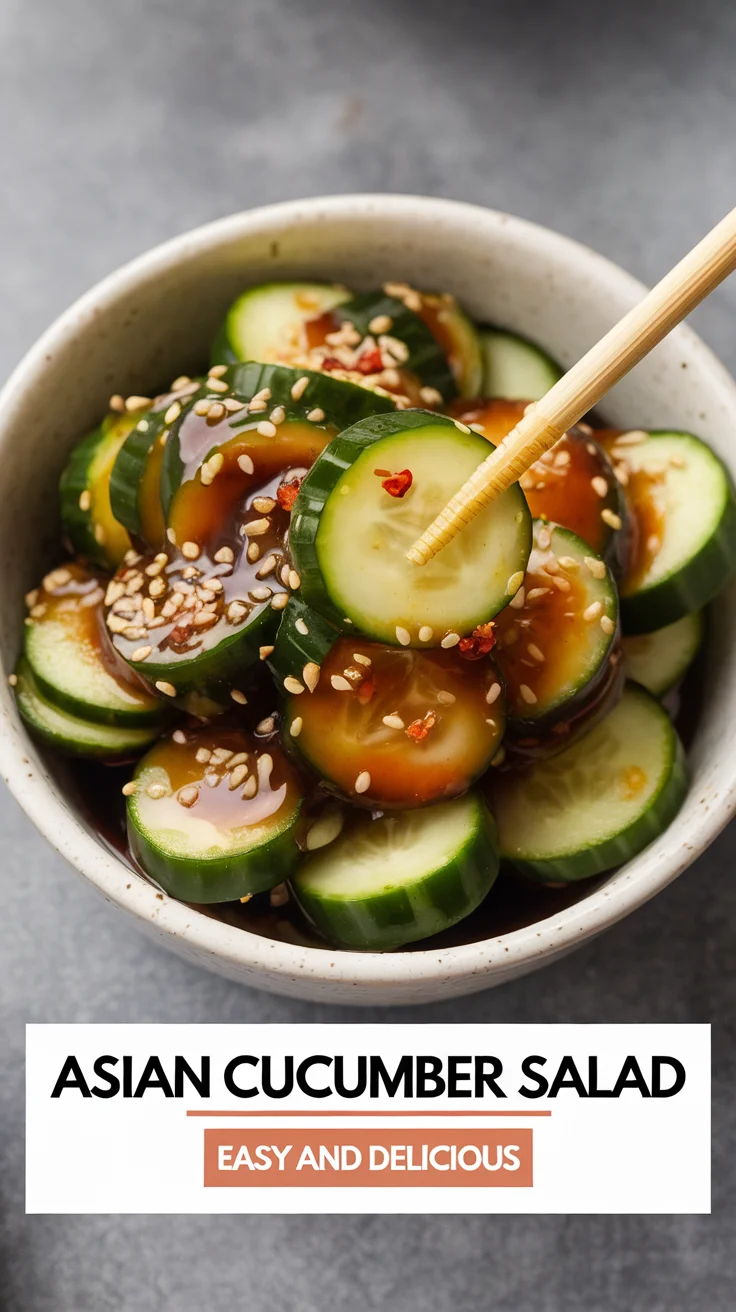If you’ve ever slurped down a bowl of ramen or enjoyed a steaming hot Korean rice bowl, you might have noticed those magical eggs with luscious, jammy yolks soaking in a dark, flavorful bath. Yes, we’re talking about Korean marinated eggs — a deceptively simple yet utterly addictive element of many beloved Asian eggs and rice pratos.
Whether you call them soy garlic marinated eggs, marinated ramen egg, or even want to explore the innovative spin-offs like Korean deviled eggs, this recipe nails it every time. You’ll learn how to get perfectly soft-boiled eggs with that iconic umami-packed marinade that turns simple boiled eggs into a superstar ingredient in your cooking arsenal.
Welcome to your definitive guide on Korean boiled egg recipes — a must-know for anyone who loves bold flavors, easy preparation, and stunning presentation.
What Exactly Are Korean Marinated Eggs?
At their core, Korean marinated eggs are soft-boiled eggs with a slightly runny, jammy yolk encased in whites that have been soaked in a savory, soy sauce-based marinade. This marinade is typically infused with garlic, sugar, sesame oil, and occasionally touches of vinegar or chili, imparting a balanced blend of salty, sweet, and aromatic notes.
Originating from Korean home kitchens, these eggs, known locally as Jang Gyeran ou Mayak Gyeran (“mayak” meaning “addictive” in Korean slang), are famed for their simplicity and flavor punch. They are a staple topping for ramen and bibimbap and are popular as quick, flavorful snacks or sides.
Why Korean Marinated Eggs Are a Game-Changer in Your Kitchen
1. Flavor Explosion in Every Bite
These eggs soak up the rich, garlicky, soy marinade, giving the whites a savory depth and the yolks a luscious creamy texture that’s pure indulgence.
2. Versatility Meets Convenience
Perfect for slapping on ramen, rice bowls, salads, or simply munching on alone. Plus, prepping them takes minimal active time.
3. Aesthetic Appeal
The deep brown hue of the marinated whites against a glowing golden yolk makes these eggs an Instagram-worthy centerpiece.
4. Protein Powerhouse
Packed with essential amino acids and micronutrients — these eggs make any meal more balanced.
The Science of the Perfect Jammy Egg
Achieving that coveted marinated jammy egg texture hinges on timing and temperature control during boiling. The yolk needs to be soft and slightly runny but not too liquid, while the white should be fully set yet tender enough to absorb the marinade.
- 6 minutes: Soft, runny yolk (too soft for some)
- 6.5 to 7 minutes: Perfect jammy texture — creamy, custard-like
- 8 minutes: Mostly set yolk, slight creaminess
- 9+ minutes: Fully hard-boiled yolk, less desirable for marination
Pro tip: Use eggs that have been in the fridge for a few days rather than ultra-fresh eggs — they peel easier!

Detailed Ingredients Breakdown: What You Need for Soy Garlic Marinated Eggs
| Ingredient | Purpose & Notes |
|---|---|
| Ovos | Medium to large, fresh but not brand new for easy peeling. |
| Soy Sauce | The salty umami base. Use light soy for subtlety, or dark soy for richer color and flavor. |
| Água | Dilutes soy sauce to avoid overpowering saltiness. |
| Alho | Adds sharp aromatic flavor; minced or sliced thinly. |
| Açúcar | Balances saltiness with sweetness — brown sugar or honey preferred for depth. |
| O Óleo De Gergelim | Adds a nutty aroma and silky mouthfeel. Optional but recommended. |
| Vinagre De Arroz | Optional; adds mild acidity to brighten flavors. |
| Chili Flakes or Fresh Chili | For a kick of heat, optional. |
| Green Onions | Garnish or marinade addition for freshness. |
Step-by-Step Guide: How to Make Korean Marinated Eggs Perfectly Every Time
Step 1: Soft-Boil the Eggs
- Bring a pot of water to a rolling boil.
- Gently lower eggs into the boiling water with a spoon to avoid cracks.
- Boil for 6 to 7 minutes depending on desired yolk softness.
- Prepare an ice bath (large bowl with ice and water).
- Immediately transfer eggs to ice bath to stop cooking and ease peeling.
- Let chill for 5-10 minutes.
Step 2: Prepare the Marinade
- In a bowl or jar, combine:
- 1/2 cup soy sauce
- 1/2 xícara de água
- 2 tablespoons brown sugar or honey
- 3-4 garlic cloves, minced or thinly sliced
- 1 colher de chá de óleo de gergelim
- Optional: 1 tablespoon rice vinegar and chili flakes
- Stir until sugar dissolves completely.
Step 3: Peel the Eggs
- Gently crack eggshells and peel under running water to avoid damaging the whites.
Step 4: Marinate
- Place peeled eggs in a container or resealable bag.
- Pour marinade over eggs, ensuring they are fully submerged.
- Refrigerate for at least 4 hours, ideally overnight for deeper flavor.
Step 5: Serve & Enjoy
- Slice eggs in half lengthwise to reveal vibrant yolks.
- Use as topping on ramen, bibimbap, salads, or eat as a snack.
- Garnish with chopped green onions or sesame seeds if desired.

How to Use Korean Marinated Eggs in Your Meals
Korean Style Eggs with Rice Bowls
Serve marinated eggs halved atop a steaming bowl of rice, sautéed veggies, and kimchi. Drizzle with sesame oil and soy sauce for a wholesome meal.
Marinated Ramen Egg (Ajitsuke Tamago)
The classic ramen companion. Add a halved egg into hot broth to add creamy texture and flavor. The dark, flavorful whites infuse the soup with umami.
Korean Deviled Eggs — A Trendy Twist
Mash the marinated yolks with a touch of mayo, sesame oil, and a splash of gochujang (Korean chili paste). Pipe back into the egg whites for a spicy, savory take on deviled eggs.
Quick Korean Meals with Marinated Eggs
Keep a batch ready for easy breakfasts or lunches. Pair with toast, avocado, and sriracha, or add to salads for a protein punch.
Cultural Tidbit: Why Are These Eggs Called “Mayak Gyeran”?
In Korean, “mayak” means “drug” or “addictive,” and “gyeran” means “egg.” The name is a nod to how irresistibly good these marinated eggs are — once you try one, you’re hooked! It’s a street food favorite and a comfort food classic in Korea.
Variations to Elevate Your Korean Marinated Eggs
1. Spicy Soy Garlic Marinated Eggs
Add sliced fresh red chili or a teaspoon of Korean chili flakes (gochugaru) to your marinade for a fiery kick.
2. Sweet & Tangy
Swap out part of the soy sauce for mirin or add more rice vinegar to brighten the flavor.
3. Chinese Style Marinated Eggs
Add star anise, cinnamon stick, and a pinch of five-spice powder to the marinade for a subtle aromatic twist — perfect for pairing with congee or fried rice.
4. Herbed Korean Eggs
Toss in some finely chopped cilantro or basil to the marinade for a fresh, herbal note.

Pro Tips to Nail Your Marinated Jammy Eggs
- Peeling Made Easy: Use eggs that are at least 4 days old. Fresh eggs are harder to peel.
- Ice Bath Is Essential: Stops cooking instantly and firms up the whites for easy peeling.
- Marinade Ratio Matters: Too salty and the eggs overpower, too weak and they won’t absorb enough flavor.
- Marinate Time: 8-12 hours is optimal; longer marination intensifies flavor but can make whites too dark.
- Reuse Marinade: Strain and keep leftover marinade for stir-fries, dipping sauces, or to marinate tofu.
Storing and Shelf Life
- Keep eggs fully submerged in marinade in an airtight container.
- Refrigerate and consume within 4-5 dias for best flavor and safety.
- Do not freeze marinated eggs as texture degrades.
- Can be eaten cold or warmed gently in hot water before serving.
Nutritional Profile: Why These Eggs Are a Smart Choice
Korean marinated eggs are not just tasty but also nutritionally rich:
- Protein: Essential for muscle repair and satiety.
- Vitamins: Packed with Vitamin B12, Vitamin D, and riboflavin.
- Minerals: Selenium, phosphorus, and choline support brain and heart health.
- Low Carb: Fits well in keto and low-carb diets.
- Healthy Fats: Contains omega-3 and omega-6 fatty acids.
They’re a nutrient-dense snack or meal addition that fuels your body and satisfies cravings.
Frequently Asked Questions About Korean Marinated Eggs
Q1: Can I use hard-boiled eggs instead?
You can, but the creamy yolk is what makes these eggs exceptional. Hard yolks lose that luscious texture.
Q2: How long should I marinate the eggs?
At least 4 hours for light flavor, but 8-12 hours overnight is best for a deep taste.
Q3: Can I use gluten-free soy sauce?
Absolutely! Tamari or other gluten-free soy sauces work well.
Q4: How do I prevent eggs from turning too salty?
Dilute soy sauce with water to balance saltiness; taste your marinade beforehand.
Q5: Can I add other flavors to the marinade?
Yes, experiment with ginger, scallions, star anise, or mirin for variations.
Why Korean Marinated Eggs Should Be Your New Go-To Quick Meal
In the age of convenience and flavor, Korean marinated eggs hit the sweet spot — simple prep, multi-purpose use, and outstanding taste. They fit effortlessly into Korean quick meals and enhance simple dishes like rice bowls or noodles.
Imagine coming home after a long day and having a stash of these eggs ready to boost your dinner or lunchbox. That’s the kind of kitchen hack that feels like magic.
Recipe Recap: Korean Marinated Eggs (Printable Style)
Ingredientes:
- 6 large eggs
- 1/2 cup soy sauce
- 1/2 xícara de água
- 3 tbsp brown sugar
- 3 garlic cloves, minced
- 1 tsp sesame oil
- Optional: 1 tbsp rice vinegar, chili flakes, green onions
Instruções:
- Boil eggs 6-7 minutes; cool in ice bath.
- Peel eggs carefully.
- Mix soy sauce, water, sugar, garlic, sesame oil (and optional ingredients).
- Place eggs in container; pour marinade over to cover.
- Refrigerate at least 4 hours, preferably overnight.
- Slice and serve with ramen, rice, or enjoy alone.
Final Thoughts: Elevate Your Culinary Game with Korean Marinated Eggs
The humble egg has never been so exciting. From humble kitchens of Korea to your dining table, this recipe for marinated jammy eggs is a testament to how simple ingredients and a bit of patience can create culinary magic.
Whether you’re a novice cook or a kitchen pro, mastering these eggs opens doors to endless Asian-inspired meals and snacks that are both easy and irresistibly flavorful.
So, what are you waiting for? Grab those eggs, crank up the soy sauce, and dive into the world of Korean flavors with this unforgettable recipe.

